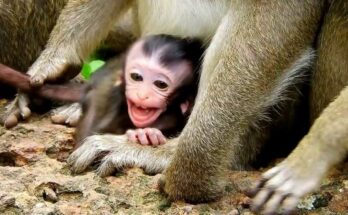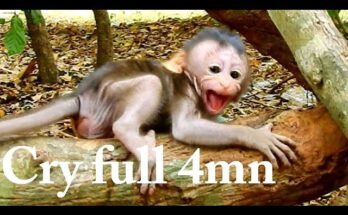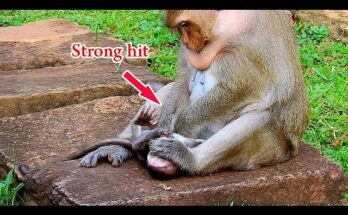Title: Bitter History! Libby Using a Lot of Cruel Ways to Wean Leo with Abusing
In the hidden corners of a tropical forest, where monkeys roam freely among the dense canopy and sunlit clearings, a heartbreaking tale has unfolded—one that echoes through the leaves like a painful memory. This is the story of Libby, a wild monkey mother, and her infant son, Leo. What began as a natural stage of growth—mother weaning her baby—turned into a disturbing chapter marked by confusion, cruelty, and emotional distress.
Leo, a small and gentle monkey, had always clung to his mother, Libby. From the earliest days after birth, he nestled close to her chest, relying on her for warmth, protection, and—most importantly—milk. Their bond, like most mother-infant relationships in the wild, was expected to be nurturing. But as Leo began to grow and explore, something changed in Libby. The natural process of weaning did not happen gradually, as it often does in monkey troops. Instead, it came harshly and violently.
Observers who had been documenting the troop for weeks noticed sudden changes. Libby, once protective and attentive, began pushing Leo away—forcefully. She would yank his tiny hands off her body whenever he tried to nurse. At first, it appeared to be an early sign of weaning, but things escalated quickly.
Libby began to use physical force. She bit Leo’s arms when he reached for her. She dragged him by the tail when he refused to leave her side. On multiple occasions, she slapped him across the face or flung him into the nearby bushes when he cried too long. Other female monkeys nearby seemed uneasy but did not intervene. In wild monkey societies, maternal behavior varies, and even harsh methods of weaning can be overlooked as discipline. But what Libby was doing went beyond.
Leo, growing weaker from hunger, continued to try. His cries grew louder each day, his small body trembling from fear and lack of nourishment. He began showing signs of stress: twitching movements, distant staring, and frequent isolation. Still, Libby did not soften.
Experts observing the troop debated possible reasons. Was Libby suffering from trauma or illness? Was she overwhelmed by environmental pressures—lack of food, too much competition, or perhaps the presence of an aggressive alpha male? One thing became clear: her actions, whether driven by instinct or stress, were deeply harmful.
Leo eventually stopped trying to nurse. He wandered further from the troop, seeking fallen fruit or bits of insects. Some older females offered him brief attention—allowing him to sit nearby—but no one replaced the role of a mother.
Libby, meanwhile, resumed her normal activities as though she had already forgotten she ever had a baby clinging to her. The forest, with its beauty and brutality, moved on.
This bitter history of Leo and Libby stands as a haunting reminder that nature is not always nurturing. Even in the most complex animal societies, suffering can emerge—not from predators or external threats, but from within the family bond itself.


